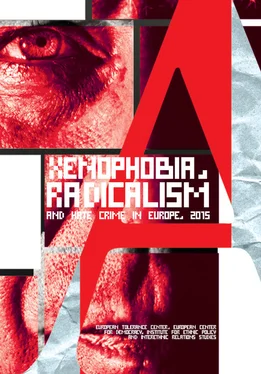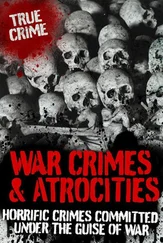Xenophobia, radicalism and hate crime in Europe 2015
Authors thank the Chairman of the European Centre for Tolerance, Mr. Vladimir Shternfeld, for his financial support of the project.
European Centre for Tolerance
European Centre for Democracy Development
Institute for National Policy and Ethnic Relations Studie
Šamir Biedrība
Athens-London-Berlin-Paris-Moscow-Roma-Krakow-Budapest-Kiev-Amsterdam
2016
Editor in Chief and Project Head:
Dr. Valery Engel, Chairman of the Expert Council of the European Centre for Tolerance
Authors:
Dr. Valery Engel (general analytics), Dr. Anna Castriota (Italy), Dr. Ildikó Barna (Hungary), Bulcsu Hunyadi (Hungary), Dr. Vanja Ljujic (Germany, Netherlands), Tika Pranvera (Greece), Katarzyna du Val (Poland), Dr. Semen Charny (Russia), SOÓS Eszter Petronella (France), Ruslan Bortnik (Ukraine), Dr. Jana Salmina (Ukraine), Alex Carter (UK)
2015 was a year characterised by an unprecedented migrant crisis, escalated terrorist activity, and increased influence of radical political parties. Growing xenophobic tensions were accompanied by the rise of populist parties on the one hand and the radicalisation of Muslim youths on the other, which played a significant role in the attitude and treatment of refugees and immigrants this year. These trends have been observed against the background of anti-Semitic and Islamophobic sentiments, which have already been high for several years, as well as institutionalised racism in public and law enforcement bodies. Given these observations, it can be said that the European society is not only in the midst of racial and religious stratification, but also faces serious changes related to the transformation of identity and the growing civilizational conflicts.
The conducted study aimed to analyse the most prominent manifestations of hate in European countries in 2015 and to identify factors that affect the demand for radicalism in society. The study also focused on the preparedness and responses of governments to modern challenges. Research was conducted in 8 EU member states (France, Germany, Greece, Hungary, Italy, the Netherlands, Poland, and the United Kingdom), as well as Russia and Ukraine, as countries who play a significant role in political and economic processes in Europe.
The study involved researchers from various universities and research centres across Europe: Department of History at Northampton University, UK; Teesside University, Centre for Fascist, Anti-Fascist and Post-Fascist Studies, UK; Department Chair of Social Research Methodology at Eötvös Loránd University (ELTE), Faculty of Social Science; Political Capital Institute in Budapest; Pantheon University of Athens; Netherlands Institute for the Study of Crime and Law Enforcement; Jagiellonian University, Dept. of History, Krakow; Russian Institute of the National Policy and Inter-Ethnic Relations Studies, Moscow; Ukrainian Institute of the Political Analysis and Management; Human Rights Centre “Religion and the Law”, Kiev.
Analysis was conducted in the following areas: legislation affecting minorities, law enforcement practices, treatment of human rights activists, hate crime statistics, xenophobic sentiments in the population, and government responses to modern challenges, such as the refugee crisis and the threat of radical Islamism. These observations form a basis for recommendations, which outline the steps to improve the situation regarding minority rights and de-escalating public tensions.
This report has been produced with the support of the European Centre of Tolerance.
1.1. Discriminatory trends in european legislation
One of the most significant elements contributing to discriminatory trends in European legislation is the non-recognition of racial or religious hatred as an aggravating circumstance in a crime. Of the countries under review in 2015, four had lacked such a provision – France, Greece, Hungary, and Poland. Until recently, the German legal system had a similar deficit, where Article 46 of the Criminal Code left it to the discretion of the court. [1] http://www.iuscomp.org/gla/statutes/StGB.htm
However, on March 19, 2015, the Criminal Code had been updated to include Art. 46.2., according to which “hate motives” are to be considered during sentencing. [2] https://www.bundestag.de/dokumente/textarchiv/2015/kw12_de_nsu/364372
In Ukraine, criminal responsibility for a hate crime is linked to “direct intent”, which must be proved. In Italy, hate views only affect sentencing if the crime was committed with the aim of influencing the broader public in order to “change its behaviour”, which is also difficult to prove in court. [3] Italy is the only country under review that, over the past 10 years, has reduced the punishment for hate crime from 3 to 1.5 years, setting the maximum fine of 6,000 euros for racial discrimination or hate speech (Law N 85/2006).
A no less important discriminatory element in European legislation is the unequal legal treatment of specific religions. For example, Greek legislation allows for discrimination of non-traditional religions with Article 13(2) of the Constitution, which states that “all known religions shall be free and their rites of worship shall be performed unhindered and under the protection of the law.” Paragraph 3 of the same article has the same qualifier, which deals with “insulting Christianity or any other known religion.”
It is worth noting that Greece legally recognises only three religious organisations: The Greek Orthodox Church, Thracian Muslims, and the Jewish community. Other organisations that consider themselves religious are excluded from this status and thus cannot own property as legal religious bodies. [4] http://cm.greekhelsinki.gr/index.php?sec=194&cid=3834
Hungarian Law “On the right to freedom of conscience and faith, religion, church, and religious organisations” (2011) also created problems for new religious organisations that have not been present in the country for more than 20 years and who have less than 1000 followers permanently residing in Hungary.
German legislation also provides for inequality of some religious organisations, dividing them into “ corporate bodies under public law ” and others. Corporate bodies under public law have the right to collect their part of the Church Tax, which is derived from the taxable income by the regional financial body (Finanzamt) and given to the community. Other religious organisations are deprived of this status, which presumes that a religious community is guaranteed long-term existence by its statute and the number of followers. Currently, such status is applied to various Christian denominations, including Orthodox Mormons, Jehovah’s Witnesses, as well as the Jewish community, and the Union of Religious Communities that consists of several smaller communities and sects (predominantly Christian). Meanwhile, the Muslim community in Germany, which has more than 4 million members (almost 5 % of the population), does not fall under the status of a corporate body under public law, despite meeting all necessary conditions.
Similar issues can be observed in Italy. In this country religious communities that have not entered in a concordat (e.g. Muslims) with the government encounter various problems.
Ukraine amended its Law “On freedom of conscience and religious organisations” in 2012, making registration of religious organisations more difficult and providing various government bodies with the authority to monitor and control their activities (including Prosecution, Ministry of Culture, and other local and central bodies). 2012 amendments also introduced a procedure for conducting peaceful public religious events, which contradicts Article 39 of the Ukrainian Constitution.
Читать дальше












